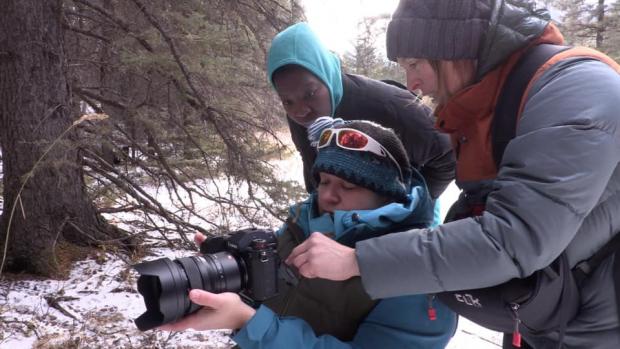(Photos: Miranda Currie during her Banff film making course)
January 13, 2020
The stark yet stunning arctic sea ice near Tuktoyaktuk has always transfixed Miranda Currie and she always imagined it as the perfect place to set her documentary Tails on Ice. Its star is fierce and intelligent - and happens to be Currie’s sled dog, Ellesmere.
“The narrative is about how she finds her place in the pack, and the story is meant to show the juxtaposition of the resilience of the Inuit sled dog and the Indigenous people in the north,” says Currie who pitched the 10-minute documentary to the National Screen Institute (NSI) in the fall of 2019.
Currie was at the Banff Centre for an Indigenous Singer-Songwriter residency when she got the call that has changed the course of 2020 for her.
“I saw that I had a missed call from Winnipeg and assumed they were calling because there was something wrong with my application. Instead, they told me I had been accepted to the NSI Indigidocs training course. I was really surprised. I just said ‘What? Really?’”
Currie’s application included reference letters from ITI’s NWT Film Commission, Western Arctic Moving Pictures and from an instructor she had at the Banff Mountain Film Festival.
“I wanted to show that these organizations and people believe that I’m capable of doing this even though I don’t have a lot of experience. I’m an underdog going in but I’m eager to learn and I know that I’ll do well with mentorship,” she explains. The opportunity to be mentored by Shane Belcourt (Red Rover, Indictment: The Crimes of Shelly Chartier) is part of what drew Currie to apply.
The course includes two phases. First, students travel to Winnipeg for a 12 day deep dive into learning about writing, producing, directing and developing a script for their documentary. By the end, they’ll have a market-ready film proposal. Four students will then be selected to move on to phase two: production. Those four students will each receive a $16,000 contribution as well as roughly $10,000 in-kind services and mentorship from an industry expert to produce their film.
The NWT Film Commission is pleased to be contributing to the program’s funding as part of its work to implement the NWT Film Strategy and its specific objective of partnering with third parties to advance mentorship opportunities.
The next few months will be busy for Currie. In addition to the NSI course, she will also be graduating from the University of Victoria’s Indigenous Language Revitalization Program in March. For Currie the overlap is natural: language, heritage and her home in the NWT have all helped to shape the content she creates. She has been learning Tłı̨chǫ and in her previous work as an educator, would bring language into the classroom through music to help children embrace their culture.
Her documentary will largely be about the role of sled dogs within northern families and the history behind dogsledding, and she hopes that there is potential for Indigenous languages to be included in the film.
“Not a lot of people are telling these types of stories,” Currie says. “My mission as an artist is to create a positive narrative around Indigenous culture and identity. I want to help kids to feel proud of their culture.”
Currie’s Indigidocs mentorship begins in February.



